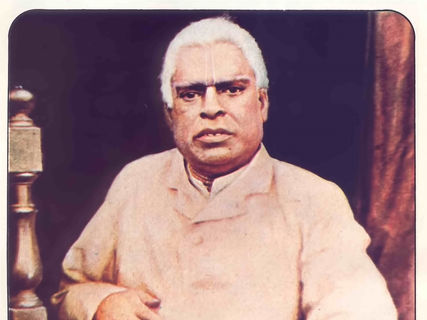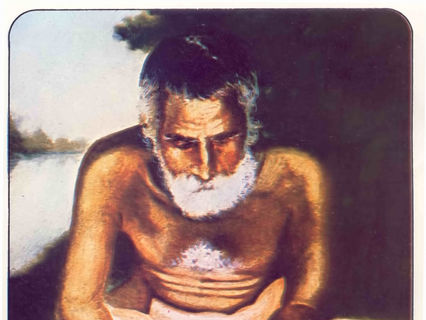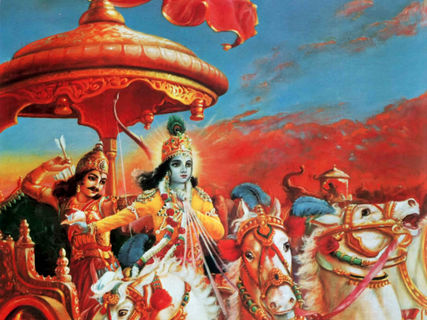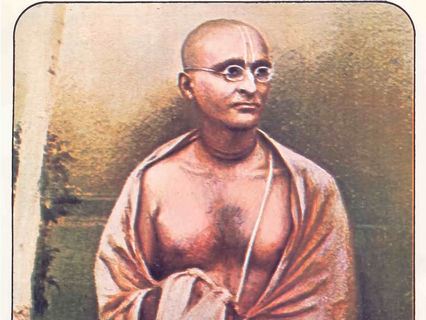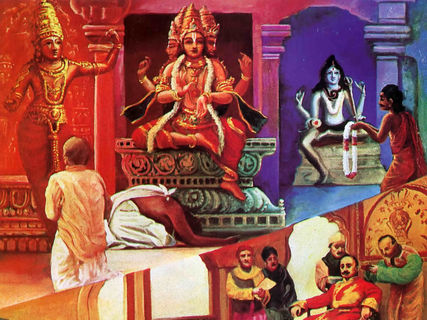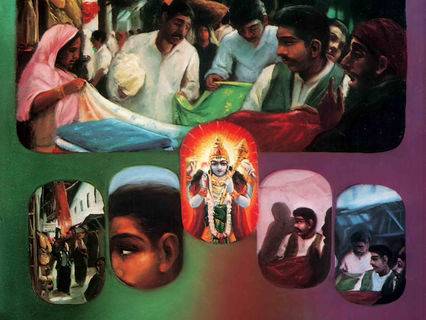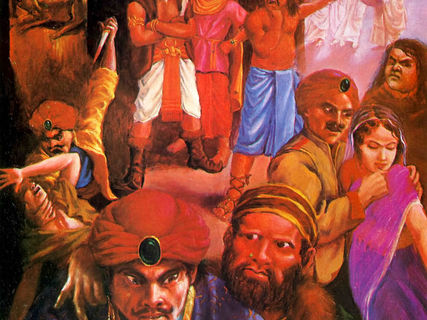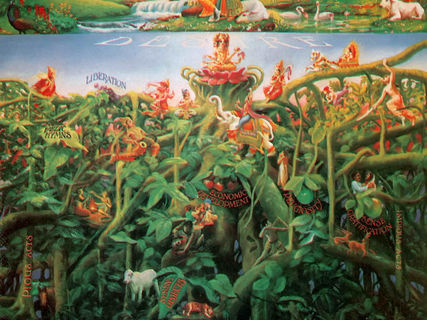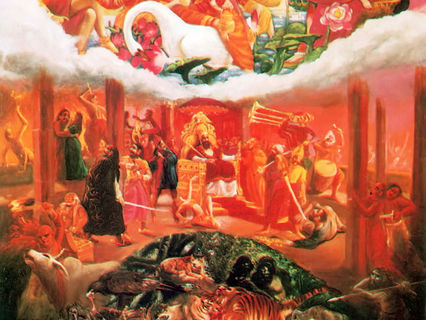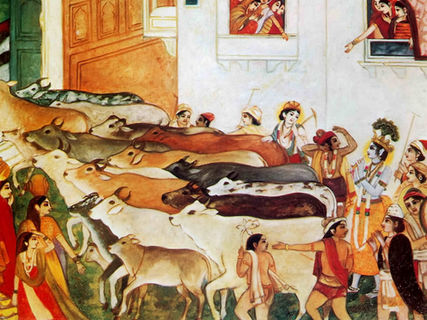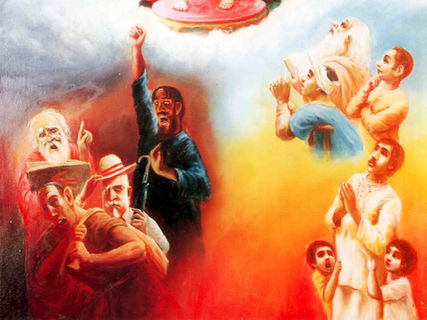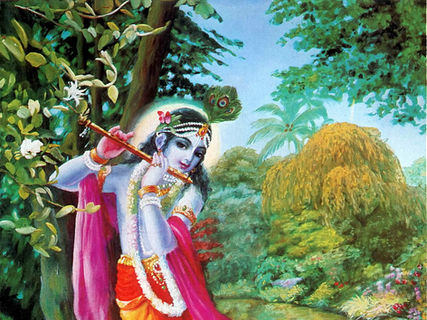
by His Divine Grace
A.C. Bhaktivedanta
Svami
Srila Prabhupada
the founder and only acarya of ISKCON
Etymology and usage (taken from WikiPedia)
The Sanskrit word véda "knowledge, wisdom" is derived from the root vid- "to know". This is reconstructed as being derived from the Proto-Indo-European root *u̯eid-, meaning "see" or "know".[22]
The noun is from Proto-Indo-European *u̯eidos, cognate to Greek (ϝ)εἶδος "aspect", "form" . Not to be confused is the homonymous 1st and 3rd person singular perfect tense véda, cognate to Greek (ϝ)οἶδα (w)oida "I know". Root cognates are Greek ἰδέα, English wit, etc., Latin videō "I see", etc.[23]
The Sanskrit term veda as a common noun means "knowledge".[24]
The term in some contexts, such as hymn 10.93.11 of the Rigveda, means "obtaining or finding wealth, property",[25]
while in some others it means "a bunch of grass together" as in a broom or for ritual fire.[26]
A related word Vedena appears in hymn 8.19.5 of the Rigveda.[27]
It was translated by Ralph T. H. Griffith as "ritual lore",[28]
as "studying the Veda" by the 14th century Indian scholar Sayana, as "bundle of grass" by Max Müller, and as "with the Veda" by H.H. Wilson.[29]
Vedas are called Maṛai or Vaymoli in parts of South India. Marai literally means "hidden, a secret, mystery".[30][31]
In some south Indian communities such as Iyengars, the word Veda includes the Tamil writings of the Alvar saints, such as Divya Prabandham, for example Tiruvaymoli.[32]
Vedic Philosophy
view on Western philosophy
Sri Isopanisad Introduction: The Importance of the Vedas:
There are 2 processes for acquiring knowledge:
-
The ascending process (aroha pantha), which is imperfect
-
The descending process (avaroha pantha), wich is perfect
How come that the ascending process (which is done through the senses) is imperfect?
Because this knowledge is acquired by the conditioned souls through their own endeavor because of four defects:
-
Imperfect Senses (Karanapatava) - The senses are limited and can easily be misled. For example, one cannot see hands in the dark
-
Under illusion (Pramada) - Accepting as real something that is not real. For example misidentifying the self as his body and mind
-
Mistakes (Bhrama) - "To err is human." All humans are prone to make mistakes and when we do, we say: Oh, we are human after all aren't we?
-
Cheating propensity (Vipralipsa) - To propagate falsehood, to present yourself as something you are not. For example foolish people who pose themselves as intelligent
Sastra-pramana:
Śrī Caitanya-caritāmṛta - Ādi-līlā - Chapter 2: Śrī Caitanya Mahāprabhu Is the Supreme Personality of Godhead
His Divine Grace A.C. Bhaktivedanta Swami Prabhupada
TEXT 86
bhrama, pramāda, vipralipsā, karaṇāpāṭava
ārṣa-vijña-vākye nāhi doṣa ei saba
SYNONYMS
bhrama—mistakes; pramāda—illusion; vipralipsā—cheating; karaṇa-apāṭava—imperfectness of the senses; ārṣa—of the authoritative sages; vijña-vākye—in the wise speech; nāhi—not; doṣa—faults; ei—these; saba—all.
TRANSLATION
“Mistakes, illusions, cheating and defective perception do not occur in the sayings of the authoritative sages.
PURPORT
Śrīmad-Bhāgavatam has listed the avatāras, the plenary expansions of the puruṣa, and Lord Kṛṣṇa appears among them. But the Bhāgavatam further explains Lord Kṛṣṇa’s specific position as the Supreme Personality of Godhead. Since Lord Kṛṣṇa is the original Personality of Godhead, reason and argument establish that His position is always supreme.
Had Kṛṣṇa been a plenary expansion of Nārāyaṇa, the original verse would have been differently composed; indeed, its order would have been reversed. But there cannot be mistakes, illusion, cheating or imperfect perception in the words of liberated sages. Therefore there is no mistake in this statement that Lord Kṛṣṇa is the Supreme Personality of Godhead. The Sanskrit statements of Śrīmad-Bhāgavatam are all transcendental sounds. Śrīla Vyāsadeva revealed these statements after perfect realization, and therefore they are perfect, for liberated sages like Vyāsadeva never commit errors in their rhetorical arrangements. Unless one accepts this fact, there is no use in trying to obtain help from the revealed scriptures.
Bhrama refers to false knowledge or mistakes, such as accepting a rope as a snake or an oyster shell as gold. Pramāda refers to inattention or misunderstanding of reality, and vipralipsā is the cheating propensity. Karaṇāpāṭava refers to imperfectness of the material senses. There are many examples of such imperfection. The eyes cannot see that which is very distant or very small. One cannot even see his own eyelid, which is the closest thing to his eye, and if one is disturbed by a disease like jaundice, he sees everything to be yellow. Similarly, the ears cannot hear distant sounds. Since the Personality of Godhead and His plenary portions and self-realized devotees are all transcendentally situated, they cannot be misled by such deficiencies.
Introduction - "Teachings of the Vedas"
That destination is called the sanātana sky, the eternal spiritual sky. In this material world we find that everything is temporary. It comes into being, stays for some time, produces some by-products, dwindles and then vanishes. That is the law of the material world, whether we use as an example this body, or a piece of fruit or anything. But beyond this temporary world there is another world of which we have information. This world consists of another nature which is sanātana, eternal. Jīva is also described as sanātana, eternal, and the Lord is also described as sanātana in the Eleventh Chapter. We have an intimate relationship with the Lord, and because we are all qualitatively one—the sanātana-dhāma, or sky, the sanātana Supreme Personality and the sanātana living entities—the whole purpose of Bhagavad-gītā is to revive our sanātana occupation, or sanātana-dharma, which is the eternal occupation of the living entity. We are temporarily engaged in different activities, but all of these activities can be purified when we give up all these temporary activities and take up the activities which are prescribed by the Supreme Lord. That is called our pure life.
The Supreme Lord and His transcendental abode are both sanātana, as are the living entities, and the combined association of the Supreme Lord and the living entities in the sanātana abode is the perfection of human life. The Lord is very kind to the living entities because they are His sons. Lord Kṛṣṇa declares in Bhagavad-gītā, "sarva-yoniṣu...ahaṁ bīja-pradaḥ pitā." "I am the father of all." Of course there are all types of living entities according to their various karmas, but here the Lord claims that He is the father of all of them. Therefore the Lord descends to reclaim all of these fallen, conditioned souls to call them back to the sanātana eternal sky so that the sanātana living entities may regain their eternal sanātana positions in eternal association with the Lord. The Lord comes Himself in different incarnations, or He sends His confidential servants as sons or His associates or ācāryas to reclaim the conditioned souls.
Therefore, sanātana-dharma does not refer to any sectarian process of religion. It is the eternal function of the eternal living entities in relationship with the eternal Supreme Lord. Sanātana-dharma refers, as stated previously, to the eternal occupation of the living entity. Rāmānujācārya has explained the word sanātana as "that which has neither beginning nor end," so when we speak of sanātana-dharma, we must take it for granted on the authority of Śrī Rāmānujācārya that it has neither beginning nor end.
The English word "religion" is a little different from sanātana-dharma. Religion conveys the idea of faith, and faith may change. One may have faith in a particular process, and he may change this faith and adopt another, but sanātana-dharma refers to that activity which cannot be changed. For instance, liquidity cannot be taken from water, nor can heat be taken from fire. Similarly, the eternal function of the eternal living entity cannot be taken from the living entity. Sanātana-dharma is eternally integral with the living entity. When we speak of sanātana-dharma, therefore, we must take it for granted on the authority of Śrī Rāmānujācārya that it has neither beginning nor end. That which has neither end nor beginning must not be sectarian, for it cannot be limited by any boundaries. Yet those belonging to some sectarian faith will wrongly consider that sanātana-dharma is also sectarian, but if we go deeply into the matter and consider it in the light of modern science, it is possible for us to see that sanātana-dharma is the business of all the people of the world—nay, of all the living entities of the universe.
Non-sanātana religious faith may have some beginning in the annals of human history, but there is no beginning to the history of sanātana-dharma because it remains eternally with the living entities. Insofar as the living entities are concerned, the authoritative śāstras state that the living entity has neither birth nor death. In the Gītā it is stated that the living entity is never born, and he never dies. He is eternal and indestructible, and he continues to live after the destruction of his temporary material body. In reference to the concept of sanātana-dharma, we must try to understand the concept of religion from the Sanskrit root meaning of the word. Dharma refers to that which is constantly existing with the particular object. We conclude that there is heat and light along with the fire; without heat and light, there is no meaning to the word fire. Similarly, we must discover the essential part of the living being, that part which is his constant companion. That constant companion is his eternal quality, and that eternal quality is his eternal religion.
When Sanātana Gosvāmī asked Śrī Caitanya Mahāprabhu about the svarūpa of every living being, the Lord replied that the svarūpa or constitutional position of the living being is the rendering of service to the Supreme Personality of Godhead. If we analyze this statement of Lord Caitanya, we can easily see that every living being is constantly engaged in rendering service to another living being. A living being serves other living beings in two capacities. By doing so, the living entity enjoys life. The lower animals serve human beings as servants serve their master. A serves B master, B serves C master and C serves D master and so on. Under these circumstances, we can see that one friend serves another friend, the mother serves the son, the wife serves the husband, the husband serves the wife and so on. If we go on searching in this spirit, it will be seen that there is no exception in the society of living beings to the activity of service. The politician presents his manifesto for the public to convince them of his capacity for service. The voters therefore give the politician their valuable votes, thinking that he will render valuable service to society. The shopkeeper serves the customer, and the artisan serves the capitalist. The capitalist serves the family, and the family serves the state in the terms of the eternal capacity of the eternal living being. In this way we can see that no living being is exempt from rendering service to other living beings, and therefore we can safely conclude that service is the constant companion of the living being and that the rendering of service is the eternal religion of the living being.
Yet man professes to belong to a particular type of faith with reference to particular time and circumstance and thus claims to be a Hindu, Muslim, Christian, Buddhist or any other sect. Such designations are non-sanātana-dharma. A Hindu may change his faith to become a Muslim, or a Muslim may change his faith to become a Hindu, or a Christian may change his faith and so on. But in all circumstances the change of religious faith does not effect the eternal occupation of rendering service to others. The Hindu, Muslim or Christian in all circumstances is servant of someone. Thus, to profess a particular type of sect is not to profess one's sanātana-dharma. The rendering of service is sanātana-dharma.
Factually we are related to the Supreme Lord in service. The Supreme Lord is the supreme enjoyer, and we living entities are His servitors. We are created for His enjoyment, and if we participate in that eternal enjoyment with the Supreme Personality of Godhead, we become happy. We cannot become happy otherwise. It is not possible to be happy independantly, just as no one part of the body can be happy without cooperating with the stomach. It is not possible for the living entity to be happy without rendering transcendental loving service unto the Supreme Lord.
In the Bhagavad-gītā, worship of different demigods or rendering service to them is not approved. It is stated in the Seventh Chapter, twentieth verse:
kāmais tais tair hṛta-jñānāḥ prapadyante 'nya-devatāḥ
taṁ taṁ niyamam āsthāya prakṛtyā niyatāḥ svayā
"Those whose minds are distorted by material desires surrender unto demigods and follow the particular rules and regulations of worship according to their own natures." (Bg. 7.20) Here it is plainly said that those who are directed by lust worship the demigods and not the Supreme Lord Kṛṣṇa. When we mention the name Kṛṣṇa, we do not refer to any sectarian name. Kṛṣṇa means the highest pleasure, and it is confirmed that the Supreme Lord is the reservoir or storehouse of all pleasure. We are all hankering after pleasure. Ānandamayo 'bhyāsāt. (Vs. 1.1.12) The living entities, like the Lord, are full of consciousness, and they are after happiness. The Lord is perpetually happy, and if the living entities associate with the Lord, cooperate with Him and take part in His association, then they also become happy.
Taken from here
The Veda's explained
Read Bhagavad Gita As It Is, explained and with commentary by a pure devotee: Bhaktivedanta Swami Prabhupada!
Watch out for the fake Hare Krishna's! They deviate from the sampradaya and belong to one of the apasampradayas
Three Sources - Prasthanatrayi
contact: 108prabhupadanugas@gmail.com
ISKCON GBC leaders say: Do not ask any questions but the whole goal of human life is to ask questions!
It is not called Hindu-Dharma with or without Deity worship but Sanatana Dharma!
Of all Yoga systems (which has temporary results as fruit), is Bhakti Yoga (which has eternal results as fruit) the best!
FIND US
OPENING HOURS:
Mon - Fri: 4am - 3.59am
Saturday: 4am - 3.59am
Sunday: 4am - 3.59am




